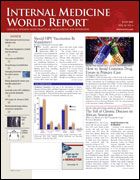Publication
Article
Internal Medicine World Report
Centrally Active ACE Inhibitors May Prevent Dementia in the Elderly
Author(s):
Kaycee Sink, MD
SEATTLE—A new study presented at the American Geriatrics Society meeting suggests that the centrally active type of angiotensin-converting-enzyme (ACE) inhibitors, which reach the brain, can help slow cognitive decline in addition to helping prevent heart or kidney failure.
The centrally acting ACE inhibitors include captopril (Capoten), fosinopril (Monopril), lisinopril (Prinivil, Zestril), perindopril (Aceon), ramipril (Altace), and trandolapril (Mavik).
"For older adults who are going to take an ACE inhibitor drug for blood pressure control, it makes sense for their doctors to prescribe one that goes into the brain," said lead investigator Kaycee Sink, MD, assistant professor of internal medicine and gerontology at Wake Forest University School of Medicine, Winston-Salem, NC.
"The hypothesis for how they [ACE inhibitors] may slow cognitive decline is that they are decreasing inflammation in the brain, and we know that inflammation is important in the development of Alzheimer's disease," Dr Sink said.
A panel of physicians reviewed test results of magnetic resonance imaging (MRI), neuropsychiatric testing, and a neurologic examination. The data were from the Cardiovascular Health Study, a long-term study of cardiovascular risk factors involving 5888 patients older than age 65 (mean age, 75 years; 64% women) from 4 counties in North Carolina, California, Pennsylvania, and Maryland.
Dr Sink and colleagues specifically looked at 1074 participants who were free of dementia at baseline and who were being treated for high blood pressure. All the participants had brain MRI during 1991 through 1994 and were followed through 1999.
During a median of 6 years of follow-up, for each year a patient was exposed to ACE inhibitors that cross the blood-brain barrier, a 50% reduction was seen in Mini-Mental State Examination scores compared with the scores associated with other antihypertensives.
Non–centrally active ACE inhibitors were associated with a trend toward an increased risk of dementia, but the results were not significant.
Although no association was found between ACE inhibitor use as a class and the risk of dementia, taking one of the centrally active ACE inhibitors showed benefits.
IMWR
"These data give us some evidence that treating blood pressure is about more than just controlling blood pressure to a certain target like 140/80 mm Hg....We can think about other comorbidities and other uses for medications we prescribe," Dr Sink told . "These medications are good for the kidneys, and they are good for the heart. They have been shown to prevent kidney failure and heart failure. Now, maybe we can think of them as preventing brain failure."
Beta-Blockers Linked to Delayed Memory Retrieval
By Rebekah McCallister
Am J Alzheimers Dis Other Demen
Prescribing medications for elderly patients is notoriously complex. Overall, beta-blockers do not impair cognition in normal patients, including the elderly, but a new study that looked at the influence of beta-blockers on delayed memory function in patients who are cognitively impaired demonstrated a trend toward worse delayed-memory retrieval in those who were taking central nervous system–active beta-blockers (. 2007; 22:57-61).
Adrenergic signaling is essential for the retrieval of intermediate-term contextual memory (encoding, storing, and retrieving information related to personal events) and spatial memory (recording information about one's environment and its spatial orientation). Norepinephrine plays an important role in memory retrieval and requires signaling through ß1-adrenergic receptors in the hippocampus. Norepinephrine activation is triggered in the hippocampus by memorable environmental stimulus.
This study supports the idea that common medications used in the cognitively impaired elderly can worsen cognitive function. Therefore, careful selection of medications is warranted to optimize the retrieval of newly formed memories.





